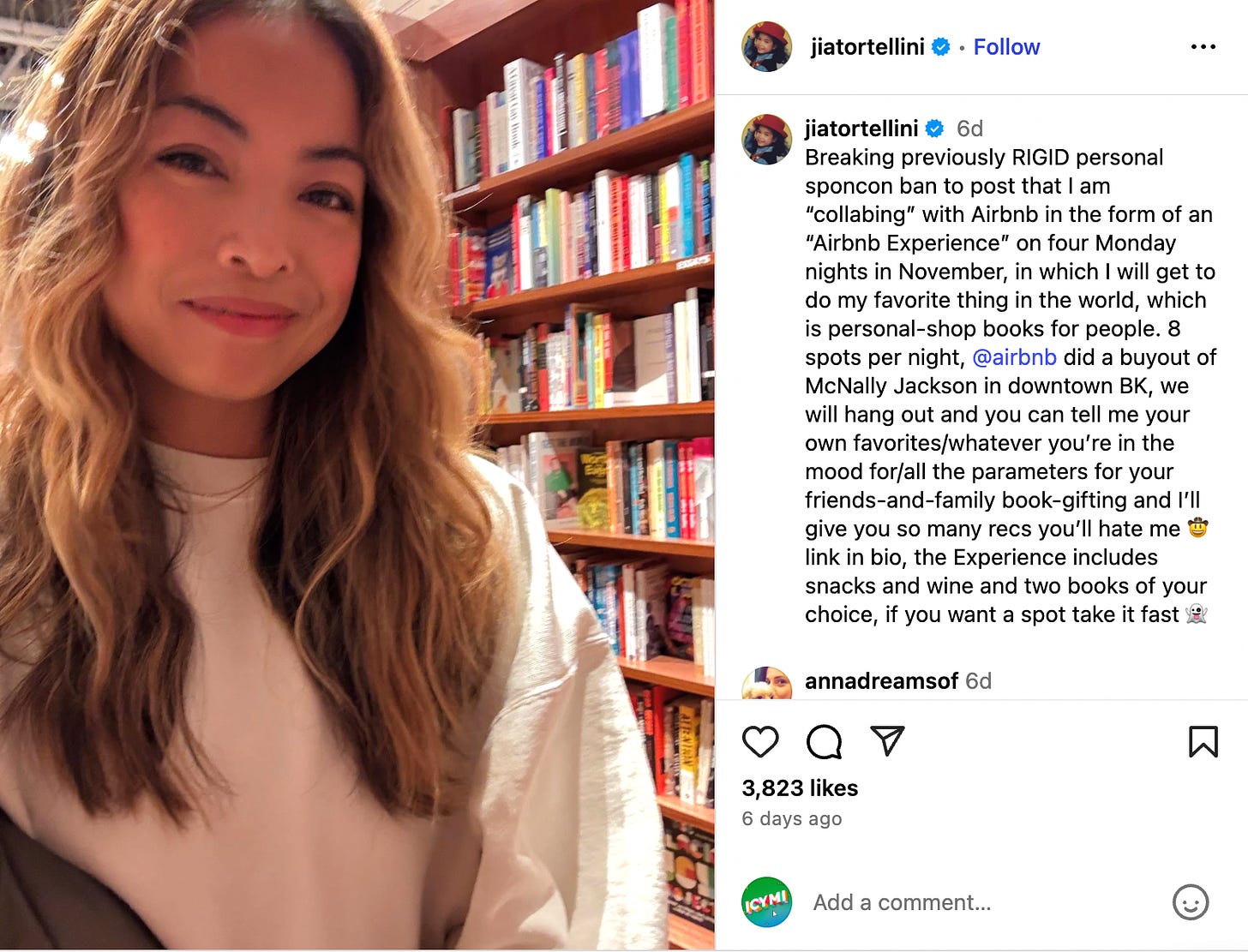Welcome to the magazine dystopia
Where journalists are tellers of truth. Sort of.
Embedded is your essential guide to what’s good on the internet, written by Kate Lindsay and edited by Nick Catucci.
Is there any ethical sponcon under capitalism??? —Kate
New on ICYMI: My cohost Candice Lim is leaving the podcast for her next chapter! In her final episode, we chat Troye Sivan and Connor Franta, and the news heard round the world: PHAN IS REAL!
Head over here to subscribe to ICYMI wherever you listen to podcasts 🫶
I was sent the Jia Tolentino Airbnb post before I ever came across it on Instagram. For those who spend their days doing things other than gazing directly at their own navels, last week the New Yorker staff writer and author announced that she was partnering with Airbnb to host a series of sessions in which she’ll play personal book-shopper to the eight people per night who paid $65 for the privilege. Commenters were quick to point out that not only is Airbnb on the Boycott, Divestment, Sanctions (BDS) list, but is also an active contributor to the housing crisis. For Tolentino, whose last post was about fasting in support of Gaza and whose work often skewers the perpetrators of our current tech dystopia, the collaboration feels, to put it mildly, off brand.
The second place I saw the news was on r/nycinfluencersnark, which I think perfectly illustrates the grey area that a journalist like Tolentino now occupies. Tolentino is not an influencer, but like so many other journalists, she has positioned herself as an independent public figure with a brand. I can’t speak for Tolentino’s finances—she is on staff at The New Yorker, and her essay collection, Trick Mirror, was a New York Times bestseller—but I know why myself and other journalists have done the same: It is essentially the only remaining route towards financial stability in an industry going through seemingly endless cycles of layoffs.
Independent journalism has flourished thanks to platforms like Substack, allowing journalists to do unbiased reporting free of the shackles of legacy media, thanks to paying readers. But as many Substackers will tell you, only a small number of them actually make a living off paid subscriptions alone. You have to diversify, which can mean running classified ads, freelancing, maintaining a day job, or collaborating with brands.
Tolentino is far from the first journalist-influencer to do the latter, but she is unfortunately the perfect example of precisely why the two careers are not interchangeable. An influencer’s job is to sell their lifestyle; a journalist’s is to tell the truth. And that truth becomes harder to trust when the writer is willing to endorse companies for money.
I’m not actually here to condemn Tolentino’s choices, though, because if anything she was just the first lamb to the slaughter. (And The New Yorker, a bastion of journalistic integrity, presumably allowed her to work with Airbnb.) Brand deals may seem antithetical to the purpose of journalism, but they feel increasingly necessary if we want to fund journalists. And while the journalists themselves hawking products is a new frontier, newspapers and magazines have always run ads next to their articles (indeed, often agreeing to not juxtapose them with coverage that might be deemed unflattering or otherwise inappropriate for the brand).
Instead, I mostly worry that we’re all too ready to accept this new era. Journalists will be more than happy to self-police this kind of thing internally, but readers may be less concerned—especially if this recent tweet is anything to go by:
Keep reading with a 7-day free trial
Subscribe to Embedded to keep reading this post and get 7 days of free access to the full post archives.



